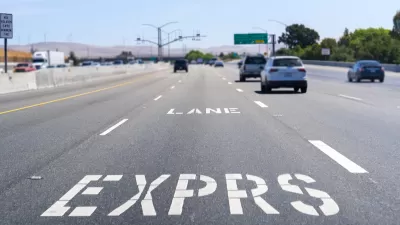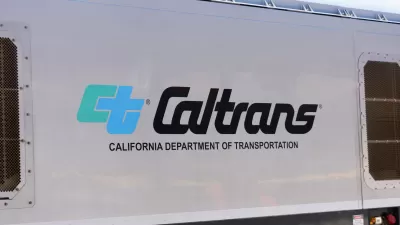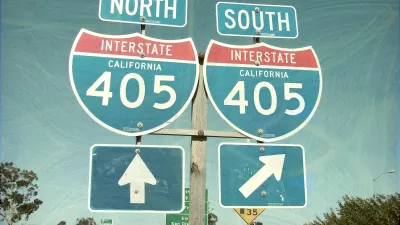With New York City's congestion pricing proposal effectively dead, DOT Secretary Peters indicated that the city had forfeited its $350 million grant, and gave other cities the chance to apply. Now Los Angles may grab over $200 million for transit.
The Los Angeles County Metropolitan Transportation Authority (MTA) unanimously voted April 24 to proceed with plans to convert High Occupancy Vehicle (HOV) lanes on the 10 and 210 freeways to High Occupancy Toll (HOT) lanes and apply congestion pricing so that the toll during commute hours would be high enough to keep traffic flowing at 45 mph in those lanes. The adjacent 'mixed-use' lanes would remain unpriced and unmanaged.
"In a nationwide competition for the money last year, Los Angeles County was eliminated in the first round after it committed only to study congestion pricing because tolls were controversial in a state that takes pride in having "freeways."
So local officials reapplied in December and struck gold after New York Mayor Michael Bloomberg's congestion pricing plan was sunk by the New York state Legislature. [See related link]. That freed up money for Los Angeles County, which federal officials have described as one of the nation's preeminent laboratories for traffic.
U.S. Department of Transportation Secretary Mary Peters will hold a news conference in Los Angeles (on April 25) to announce the deal, first reported in The Times April 24. [See related link].
"Events moved quickly this week after the MTA learned that the U.S. Department of Transportation was prepared to offer local transit officials more than $200 million to buy about 60 high-capacity buses and upgrade Metrolink train service in the San Gabriel Valley. In exchange, the MTA board had to agree to try on its freeways some so-called congestion pricing, a toll scheme in which the charge varies by time of day."
Thanks to MTC-ABAG Library
FULL STORY: MTA votes for tolls on some carpool lanes by 2010

Alabama: Trump Terminates Settlements for Black Communities Harmed By Raw Sewage
Trump deemed the landmark civil rights agreement “illegal DEI and environmental justice policy.”

Planetizen Federal Action Tracker
A weekly monitor of how Trump’s orders and actions are impacting planners and planning in America.

How Atlanta Built 7,000 Housing Units in 3 Years
The city’s comprehensive, neighborhood-focused housing strategy focuses on identifying properties and land that can be repurposed for housing and encouraging development in underserved neighborhoods.

In Both Crashes and Crime, Public Transportation is Far Safer than Driving
Contrary to popular assumptions, public transportation has far lower crash and crime rates than automobile travel. For safer communities, improve and encourage transit travel.

Report: Zoning Reforms Should Complement Nashville’s Ambitious Transit Plan
Without reform, restrictive zoning codes will limit the impact of the city’s planned transit expansion and could exclude some of the residents who depend on transit the most.

Judge Orders Release of Frozen IRA, IIJA Funding
The decision is a victory for environmental groups who charged that freezing funds for critical infrastructure and disaster response programs caused “real and irreparable harm” to communities.
Urban Design for Planners 1: Software Tools
This six-course series explores essential urban design concepts using open source software and equips planners with the tools they need to participate fully in the urban design process.
Planning for Universal Design
Learn the tools for implementing Universal Design in planning regulations.
Jessamine County Fiscal Court
Caltrans
Institute for Housing and Urban Development Studies (IHS)
City of Grandview
Harvard GSD Executive Education
Toledo-Lucas County Plan Commissions
Salt Lake City
NYU Wagner Graduate School of Public Service





























